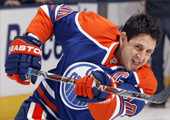 It’s playoff time. How do you prepare to have a successful playoff run? How can you maximize energy without sacrifice? How long should you rest?
It’s playoff time. How do you prepare to have a successful playoff run? How can you maximize energy without sacrifice? How long should you rest?
For many hockey players, the long road to the “real” season is just beginning. In short, all the tension the playoffs can build is here, as teams prepare at all levels. With so much on the line, I’m often asked, “ How can I ready myself for the long journey”?
In an ideal situation, 1 to 2 weeks off would be great. It gives players time to heal nagging injuries and mentally reposition themselves. Unfortunately, most players and teams don’t have that luxury, even at the professional level. The usual 2-4 days off, and then full steam ahead!
As things begin to intensify, energy levels have a tendency to taper off. We sail on adrenaline to get us through the first game, but soon the nerves calm and its business as usual. While more is at stake, in reality, the game hasn’t changed. If you’ve been training correctly, then your regimen should remain the same.
If the goal is to maximize energy stores, so you can continue to battle in the third period, then rest is key. There are a couple things that you should do to prepare. Both on and off the ice, players need time for their bodies to repair and regenerate. Eat properly, meaning feed yourself with nutrients that maximize energy. Sleep well, this goes without saying, 8 hours a night should be the goal. Drink plenty of fluid, our bodies are 80% water.
Hopefully, you were able to get in the gym 2-3 days per week throughout the season. If so, you’ve done the work to keep yourself healthy throughout the season. Now, it’s time to allow for recovery. If you’re practicing daily, then 2 days a week in the gym should be your protocol. Dedicate this time to what I refer to as “maintenance” training. A maintenance program should involve 4 things:
1) Flexibility: After a long season, your muscles are sore, tight and short. Soreness is due in part to lactic acid build up and microscopic muscle tears, which can be lessened by following a healthy diet. Tightness and shortening of the muscle is an indicator of being overworked. The thin sheath of connective tissues, called fascia, that covers each muscles becomes tight, like a noose, and restricts muscles from fully lengthening. Adding a foam roller to your arsenal is key. Before and after each practice, game, and off ice training sessions, you should be using the foam roller on your legs. The roller will keep your muscles fresh by helping to remove lactic acid from muscles, lengthen muscles and loosen fascia.
2) Elasticity: Dynamic stretching increases elasticity of the muscles. Additionally, dynamic stretching provides muscles with the proper warm up period before an prior to games, practices and workouts by introducing healthy blood and nutrients to the muscles. This prevents tears to both, muscles and tendons.
Video-3D Reach Sequence
3) Agility/Speed: Ideally, the off-season work should have been time where you built power and strength. Due to the nature of the game, you are likely to lose some of that power throughout the season. But that’s ok! During playoff time we should focus on speed and agility. Exercises that increase foot speed, coordination, and lateral transitions are commonly referred to as plyometrics. Not only does plyometric exercise increase agility, but it also addresses the other important factors mentioned above.
Video-Russian Lunge Plyometric Exercise for Hockey
4) Mental Preparation: Finally, one of the most important factors is the mental preparation. Nerves are running high. You’re flying on Adrenaline. Take the time to prepare yourself. Learn from your past, there’s always a take away. Do things that you enjoy outside of the game. Find something that will distract you temporarily. In fact, one of the best ways to reconnect is through yoga. It’s certainly a growing trend in the hockey world. Plus, yoga addresses all 4 aspects of the maintenance plan during the playoffs.
For more information about an in season training plan and how you should prepare for the playoffs, visit www.hockeyot.com. We provide you with elite resources, including how-to videos to maximize your potential.















